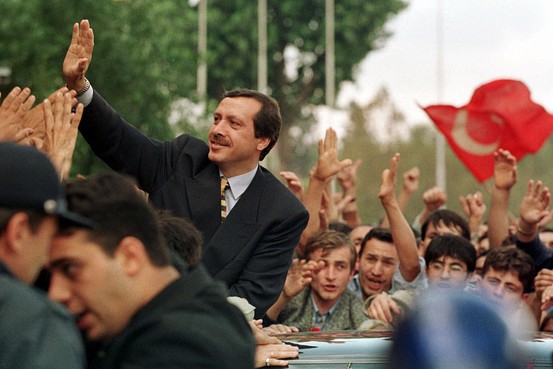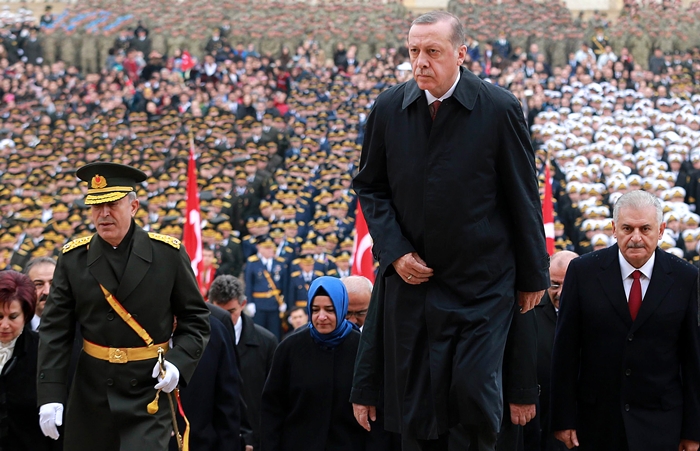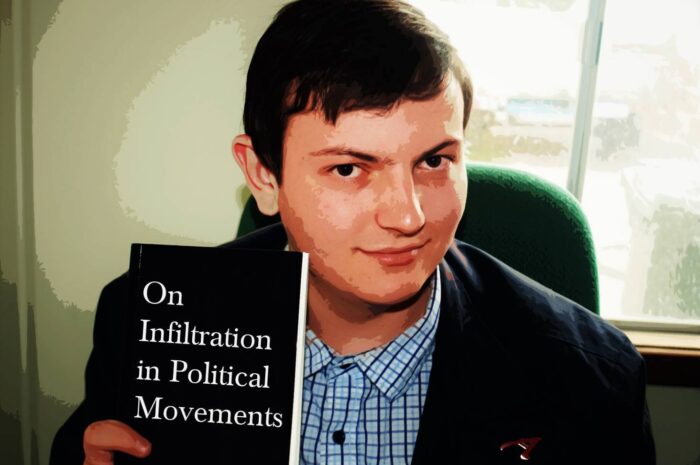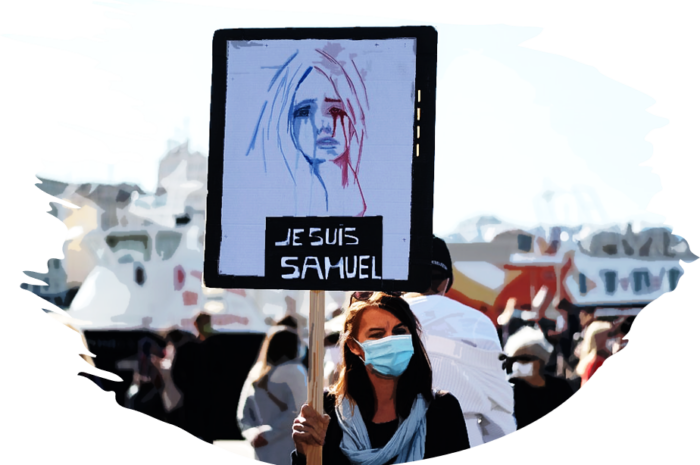
Note: The following article was made into a video here.
A dark veil is slowly rising over Turkey, as the ‘Justice and Development Party’ (aka, ‘AK Party’ or ‘AKP’ for short) has declared a state of Emergency. It comes in the wake of a coup d’état attempt by the Military against Turkish President Recep Tayyip Erdoğan. With Soldiers blocking Bosporus Bridge in Istanbul and deploying tanks outside Atatürk airport, issuing a curfew for residents nearby, helicopters and jets flew over Ankara and declared that the Military had taken over the government. This was only to be the beginning of the long few days of struggle, violence and horror that would grip Turkey. The end of which would begin a purge upon Turkish society; one that is still ongoing and one that is helping elevate an authoritarian to the status of ‘totalitarian’.
Under the cover of night, pro-coup (‘coupists’) forces, within just the span of a few hours, bombed police headquarters, occupied AKP offices and held up broadcasting buildings of the Turkish Radio and Television Corporation. A statement was then issued upon seizure, claiming that a restoration of democracy was underway:
“Turkish Armed Forces have completely taken over the administration of the country to reinstate constitutional order, human rights and freedoms, the rule of law and general security that was damaged.”— Tijen Karaş, TRT, July 15th
However, despite this pronouncement, this was quickly rejected by both Prime Minister Binali Yıldırım and later by Erdogan, who both went on to state the opposite of the coupist, notably that those involved in the coup are a ‘threat’ to Turkish democracy. Erdogan, conveniently on vacation in Marmis at the time of the coup’s inception, proclaimed via the phone app ‘FaceTime’ on Turkish state media that those loyal to the regime (loyalists) were to take to the streets and show their loyalty in form of opposition to coupists. What followed was nothing short of chaos, as loyalists clashed with coupists on the streets and blood began to spill.
Firing Bullets at oncoming loyalists at Bosporus Bridge, coup soldiers tried in desperation to hold onto control. However, despite their desperation, heavy resistance by both protesters and police soon proved to be too much, as coup soldiers surrendered. Those still loyal within the military began fighting remaining coup soldiers, distinguishing themselves from coupists with red and white sashes around their arms. Mobs of Anti-coup protesters came out in droves across the country, cheering praises to Erdogan and hissing at those who dared dissent against the government—reflecting a darker side of Erdogan’s Turkish society.
Moreover, in a ditch attempt to strike at AKP, coupists blew up parts of the parliament building and fired upon Erdogan’s hotel…after Erdogan had left it. By the morning of July 16th, it was evident that the coup had failed in its goal to oust Erdogan. Upon arrival in Istanbul, greeted by thousands of loyalists and a handful of Turkish Defence Force soldiers (TKP), Erdogan addressed the nation and declared that the AKP government was in control and that the military was to undergo a ‘cleansing’. Erdogan also went on to blame the motivation behind the coup on an old comrade and now rival, a person that leads one of the biggest interfaith movements, Fethullah Gülen—Founder of the Gülen movement.
Now had this been the end of the story, one may be led to the conclusion that order restored itself in Turkey and life went on as usual. However, no coup ends without bloodshed and nothing is ever that easy. Rounding up coupists throughout Turkey, police and loyalists of Erdogan captured and belted—some were even lynched by mobs—dozens of coup soldiers. (Many of them were mere boys, no older than twenty-five, beaten by enraged mobs with belts—fear stricken in the face of bloodlust.) With Hundreds killed already during the coup and many thousands wounded, Erdogan still goaded on loyalists to keep protesting—this affair was not to be over within a mere twenty four hours.
Plotters of the coup range in rank from the highest in Turkish command to the lowest. From Airforce Commander Akın Öztürk who was blamed for the orchestration of the coup to General Adem Huduti—a man who was, a couple months prior to the coup, praised by the AKP for killing ‘terrorist’ members of the Kurdistan Workers’ Party (PKK). How the mighty have fallen. However, what started to become clearer with this ‘cleansing’ of the military was ‘what’ this failed coup was serving. A darker plan was afoot, as Erdogan slowly removed high officials and replaced them with those loyal to AKP. Political rivals, those in months and years prior who had opposed Erdogan’s censorship of the media in late last year, escorting each one by one and handing them over into custody. A stench of tyranny was in the air.

Source: WaPo.
“Democracy is like a train: when you reach your destination, you get off.” — Recep Tayyip Erdoğan, Muslim Arab Youth Association Conference, 1996
Uttered before a crowded hall of young Islamic youth, the then Mayor of Istanbul Recep Tayyip Erdoğan, tight-fisted and full of zeal, denounced Democracy as a means to an end in 1996. Secular Democracy, Erdogan remarked, was merely a ‘tool’ to alter society towards an Islamic trajectory. It should have been clear back then what Erdogan’s plans were for Turkish Democracy—very different from what Mustafa Kemal Atatürk, founder of the Turkish Republic, intended. Desiring to impose Islam upon society (Islamism), Erdogan showed early signs of the authoritarian path that he was later to lead.
Before one goes on, an important distinction is to be made between ‘authoritarians’ and ‘totalitarians’. Where the former desire for centralised power, notably in the form of a reduction of liberties and an increased power in the hands of the few; the latter desires the totality of control over others. Totalitarians desire the impossible, chiefly desiring absolute power over individuals. From the physical to the mental, a totalitarian desires the elimination of liberty and the total imposition of an ideology upon an individual. Using censorship, education, secret police and so on, the totalitarian uses all means available to subjugate and impose tyranny upon others.
Moreover, where authoritarian regimes limit press freedom and limit certain individual freedoms, absent the economic and social dimensions, totalitarian regimes go further in limitations. Totalitarian regimes utilise every possible dimension and intrude in the private lives of individuals. Instead of just the public sphere controlled by a dominant power, the private sphere is also occupied by a dominant power.
Furthermore, and to emphasise this difference of regimes (because it is important in the greater context when discussing Erdogan), what makes an authoritarian state like Singapore (for example) different from a totalitarian state like Saddam’s Iraq is that in the latter case one has to live in absolute fear—constantly. Kanan Makiya’s aptly titled book ‘Republic of Fear’ depicts Saddam’s Iraq perfectly, chiefly as a state of terror with around the clock disappearances, torturing and killing of political opponents, state ‘terrorists’ and civilians. (I have heard Singapore be described as a ‘totalitarian’ state, notably by Amos Yee in an interview with Dave Rubin. However, the reason why I take issue with that is that it downplays actual totalitarian regimes. One can still visit Singapore, live a relatively good life and leave it whenever they so choose. This is not the case in most totalitarian states, which deny individuals a good life with a tyrannical living experience.) Authoritarian regimes are watered down versions of totalitarian ones; however, if the authoritarians within said regime wish to elevated themselves to the status of ‘totalitarians’, then they merely need to catch that yearning for the impossible—total power. Erdogan caught this yearning early on.
A yearning for Islamism, notably a Turkish Islamist state, became more evident during Erdogan’s time as Mayor of Istanbul. Aligning with the Islamist ‘Welfare Party’ ‘Refah Partisi’, Erdogan took part in campaigns levied against the government. Attracting attention from the Turkish Constitutional Court, Refah Partisi’s Islamist activities were quickly deemed as ‘unconstitutional’ and soon were banned in 1998. Many protests soon followed and mass support for the party’s reinstatement grew as Islamists, which included Erdogan, vehemently opposed the court’s decision.
However, despite protests and calls to action, sentiments for support deteriorated and many arrests on protesters were made. “The mosques are our barracks, the domes our helmets, the minarets our bayonets and the faithful our soldiers….” For inciting religious hatred and breaking the law, Erdogan was imprisoned in 1998. In addition to this, Erdogan also was denied ability to take part in the political process of Turkey and had to give up his position as mayor soon following the judgement’s enforcement—a mark that seethed.
Nevertheless, Erdogan’s yearning for power and political capital helped him in founding the AKP in 2001. Under an agenda of ‘conservative democracy’ (a term for a political ideology that seeks more to pretend it is not Islamist in nature when actually is), Erdogan sought to work this time with the political process than against it. Focusing energy on pushing for social services and aiming at democratic reform policies, Erdogan’s strategy made considerable headway in the 2002 general elections—appealing to both upper and lower class voters. With a two-third majority vote in favour, AKP’s co-founder Abdullah Gül took power as Prime Minister over Turkey and helped annul Erdogan’s political ban. Almost in a chess-like move, AKP rescheduled the election in the subsequent months and made Erdogan their candidate. Swapping hands (essentially, ‘trading places’), Gül stepped down and allowed Erdogan to assume the Prime Ministership upon AKP’s victory. The chessboard was in place and the pieces set for Erdogan’s rise to power.
Manoeuvring each piece in place and taking down every obstacle in way, Erdogan slowly climbed the political ladder over the next ten years with the support of AKP. Digging its hands in the media and attempting to manufacture phantoms, AKP—after its second victory in the 2007 general elections—levied charges against political rivals, ranging from military officials to journalists, for being a part of a ‘terrorist’ organisation known as ‘Ergenekon’ (a shadowy organisation alleged to have been planning assassinations and bombings on the AKP).
In a series of trials, over 270 people were accused of ‘plotting’ against the government, many of them had—in prior years—criticised AKP government’s policies. Using Ergenekon as leverage to achieve greater power, especially by accusing and launching trials, as well as investigations into ‘members’ of it, Erdogan’s authoritarianism was showing. However, if the Ergenekon trials did not show Erdogan’s desire for control, then it would be the AKP’s reaction to the Gezi Park Protests in 2013.
Initially few in numbers, protesters grew in size in reaction to both Erdogan’s growing authoritarianism and the police backlash to an Istanbul park sit-in protest—in which police used violent means, such as tear gas and forced removal of protesters, to try quell the protest. Erdogan cracked down severely in response to the [Taksim] Gezi Park Protests, calling police to march in droves against the protesters. In addition to this, misinformation about alleged assaults by protesters on civilians was spread by TRT (state media) and attempted censorship of social media, such as sites like Facebook and Twitter, became apparent with AKP pressuring businesses to not allow coverage as the protests went on. An abuse of power would be an understatement for Erdogan’s actions in response to the Gezi Park protests; what he was engaging in was pure political manipulation and corruption.
Throughout Erdogan’s rise to prime ministership and eventual succession as President in 2014, AKP had been in power for over ten years with a trail of authoritarianism to back it. Erdogan’s manipulation, political corruption and yearning for control made him many enemies, most notably Fethullah Gülen. A once ally of Erdogan, Gülen’s ‘Hizmet’ (aka ‘Gülen movement’, whose theology preached a more liberal version of Islam) movement gave inspiration to many people within Turkey. ‘A state within a state’ was present as millions followed the movement, something that only angered Erdogan upon his fallout with Gülen in 2013. Following corruption investigations that same year, Gülen sought to challenge Erdogan’s political position, which only further split the two—leading to the eventual crackdown of movement members in the subsequent years. An authoritarian cannot have dissent; there comes a breaking point. Erdogan’s breaking point was with Gülen. Power corrupts absolutely; Erdogan is no exception.

Source: Ahval.
History repeats itself in so many ways. President Recep Tayyip Erdoğan’s crackdown of coup soldiers and military commanders parallels the ‘New Order’ regime’s crackdown of the Indonesian Military in 1965. Using the failed coup as a pretext to rid communists and their sympathisers, the New Order swiftly got rid of almost all opposition to it—thousands were captured, tortured and killed in the purge on Indonesian society that followed. Currently, as I write, thousands of soldiers have been captured by loyalists of AKP and are currently undergoing torture in jail cells. High up military officials have been removed and replaced by Erdogan Loyalists; thousands of judges have been removed from their positions and hundreds of academics, either sympathetic to Hizmet or critical of the government, have been removed from their positions as well. Erdogan has unleashed a purge on Turkish society.
Whether or not the attempted coup to topple the government came as inspiration by Fethullah Gulen (who has denied allegations by Erdogan), by Military officials seeking to restore secularism or by Erdogan himself, the outcome has been the same: More power to Erdogan. (I believe that the coup was done by Military officials who were inspired by Gulen and wanted to try restore democracy. However, disorganisation and Erdogan catching on too quickly most likely sabotaged the coup from working.) This coup has been used as leverage for Erdogan to propel himself as uncontested leader of Turkey’s already illiberal system of democracy. I will not be surprised if Erdogan executes all those involved in the coup against him. His denied already political prisoners the ability to see lawyers and family members, and AKP is doing its best to reinstate the death penalty, which means that bloodshed will continue.
Take note, ladies and gents, of this failed coup in Turkey. If you learn anything from it, let it be a lesson in how a totalitarian rises. Erdogan is the next Assad in the making. As he slowly consolidates power, Turkey will find itself more and more morphing into a Closed Society. Furthermore, given Erdogan’s sympathies towards Islamic religious zealots who seek to impose their religion upon society (aka ‘Islamists’), Erdogan will most likely follow the path of religious totalitarians and form an Islamist dictatorship. Look at how the Islamists stand behind Erdogan’s regime and occupy Secular centres, singing praises and hissing at dissenters.
Totalitarianism, especially the religious kind, is truly ugly to witness. Those who seek the impossible, namely the totality of control over others, can be said to epitomize what it means to be a totalitarian. It is purely a delusional pursuit of the impossible, but yet there is always those who seek the impossible and take it upon themselves to subjugate others to do so. Totalitarianism and despotism always end the same: Destruction. No tyrant lasts forever and history has shown the course of what happens to each regime that tries to.
Make no mistake, Erdogan’s regime will crumble but only in time. For now, Erdogan will only tighten his stranglehold over Turkey and elevate himself to the status of totalitarian. The tyrant will now only continue eradicating liberties of Turkish citizens and find more ways to ensure that the regime stays afloat. However, before it does there will be bloodshed, suffering and horror.
All totalitarians, despots and tyrants fall.
None last forever.
Written by Anthony Avice Du Buisson (31/07/2016)

Source: AFP PHOTO / ADEM ALTAN.




